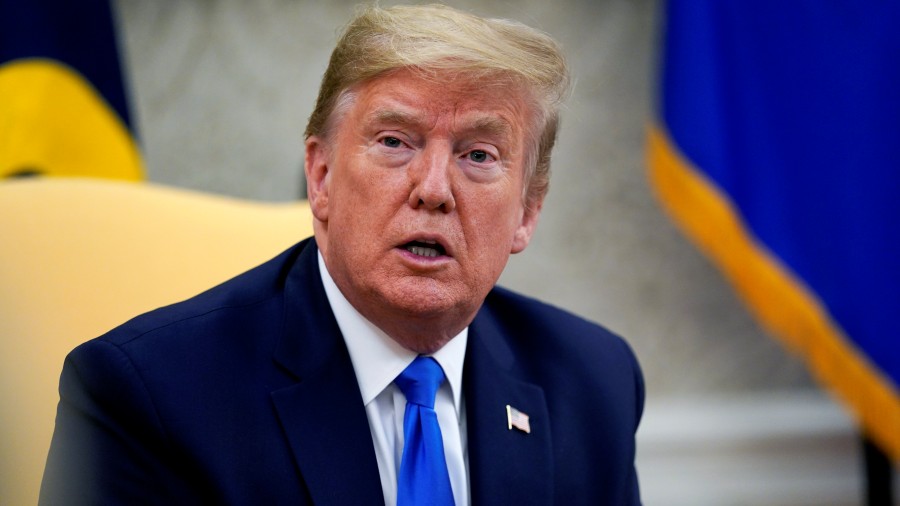Barely 11 months after President Donald Trump was acquitted in a momentous Senate trial, the US now confronts the possibility of yet another impeachment battle in the twilight of his presidency, a final showdown that will test the boundaries of politics, accountability and the Constitution.
No President has ever been impeached for high crimes and misdemeanours twice. But Speaker Nancy Pelosi was weighing bringing a new article of impeachment to the House floor charging Trump with “incitement of insurrection” for encouraging the mob that ransacked the Capitol to disrupt the solemn process finishing his own election defeat.
If Pelosi proceeds, the House could approve the article in days, this time with the support of even some disaffected Republicans, sending it to the Senate for a trial unlike any of the previous three in American history. While it seemed unlikely that 17 Senate Republicans would join Democrats for the two-thirds necessary for conviction, the anger at Trump was so palpable that party leaders said privately it was not out of the question.
The fresh bid to remove Trump from office and strip him of his power without waiting until his term expires on January 20 capped a traumatic week that rattled Washington more than any since the terrorist attacks of September 11, 2001, as National Guard troops stood watch over the Capitol and downtown businesses remained boarded up.
Emotions were raw. The White House was in meltdown. The military was on edge. The cabinet was in revolt. The Republican Party was in civil war. And an unrepentant President was in hiding, stripped of his social media bullhorn, ostracised by many allies and at odds even with his staff and loyal Vice-President.
The storming of the Capitol by Trump’s supporters that left five people dead, among them a police officer, transformed the politics of the city in ways that were still hard to measure. A new impeachment would be more than a do-over of the drive that failed last year because this time the offence was not a phone call to a foreign leader captured on the dry pages of a transcript but the siege of American democracy played out live on television for all to see.
“Insurrectionists incited by Trump attacked our nation’s Capitol to stop Congress from accepting the Electoral College results,” said Representative Ted Lieu of California, who began drafting the article of impeachment with Representative David Cicilline of Rhode Island while sheltering during the Capitol takeover and was later joined by Jamie Raskin of Maryland. “People died. We cannot just issue sternly worded press releases as a response. Unless Trump resigns, Congress must impeach to hold him accountable.”
With Lieu and his co-partners planning to introduce their article on Monday with more than 190 co-sponsors, Pelosi spent Saturday consulting fellow Democrats and told them in a letter to be prepared to return to Washington within days for possible action. She did not say explicitly that she would pursue impeachment but vowed to hold Trump accountable. “There must be a recognition that this desecration was instigated by the President,” she wrote.
Yet the timing of such an effort, with just 11 days until Trump is to leave office, scrambled the equation. Senator Mitch McConnell of Kentucky, the Republican leader, indicated that under Senate rules a trial could not begin until January 19, the day before President-elect Joseph R. Biden Jr.’s inauguration, meaning the process would not advance quickly enough to avert any feared dangerous moves in Trump’s last days in power.
That raised the prospect of conducting a trial after Trump vacates the White House, overshadowing the opening days of Biden’s administration at a time when he would like to turn the page and confront crises like the coronavirus pandemic, which has grown even deadlier while attention has focused on Washington’s political wars. A nationally televised trial could dominate discussion and would prevent other business in the Senate.
Some of Trump’s critics argued that it would be important to hold a trial even if he is already out of power in order to bar him from ever seeking office again, a penalty envisioned by the Constitution — and perhaps more important, to render a verdict condemning his actions for the sake of history.
“We’ve never had to consider even the possibility of impeaching a President twice, or in the final days of his presidency,” said Michael J. Gerhardt, a constitutional scholar at the University of North Carolina who testified in Trump’s first impeachment and favours another trial. “But we’ve never had a President before who’s encouraging sedition as Trump has done in his last few days in office.”
Yet even some of the President’s harshest critics worried that a last-minute impeachment and an overtime trial could help him rally supporters by presenting himself as a victim not a villain, allowing him to turn the focus from his own actions to those of his opponents.
“It historically will be important,” said Andrew Weissmann, who was a deputy to the special counsel Robert S. Mueller III and recently published a book, Where Law Ends, expressing frustration that the President was not held fully accountable for his actions during the Russia investigation. “But the danger is he is acquitted and the momentum of condemnation now is lost. Plus, until we change the mentality of his base, we have not gotten at the underlying issue.”
New York Times News Service











